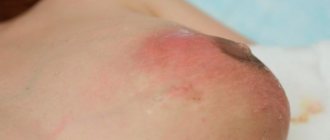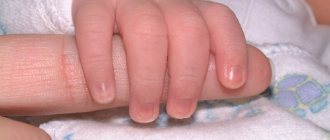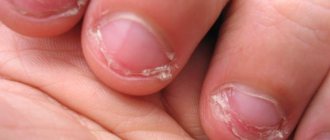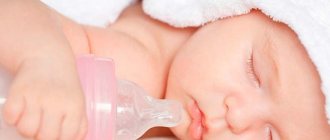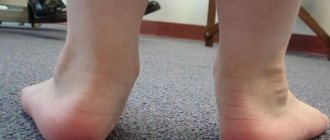Why is nail biting a habit dangerous?
- nail growth slows down;
- nails take on an unsightly shape that cannot be corrected;
- fingers are subject to deformation;
- inflammation may occur on the skin of the fingers;
- worms may appear;
- Intestinal infections may occur due to microorganisms entering the body;
- problems with teeth arise;
- children are subject to ridicule by other children;
- The baby develops complexes.
Strengthening nail plates with calcium
Nail plate care products containing calcium strengthen it. When a child bites their nails, they are more susceptible to splitting. Such products prevent the formation of cracks, and nails become stronger.
The concentrated preparation contains a special, easily digestible form of amino acids and calcium. In addition to strengthening, the product creates a lamination effect, making nails smooth and shiny.
Brittle, peeling nails indicate a lack of calcium in the body, so the child’s diet should be enriched with foods that contain this trace element in large quantities.
But external care will be ineffective if the body lacks calcium. This problem is especially observed during periods of intense growth, when bone mineralization occurs rapidly. A symptom of a lack of this element is brittle nails, their delamination, and the appearance of white spots.
To make up for the deficiency, first of all, it is necessary to adjust the child’s menu and select products with a high calcium content.
If there is a need to take mineral complexes, you need to consult a specialist. Only a pediatrician will be able to find out the advisability of taking the drug, select the necessary one, prescribe the appropriate dosage and duration of administration.
Disease or bad habit
- Physiological:
- Nails are not properly cared for and therefore children independently get rid of what bothers them and what they don’t like.
- The baby enjoys it, he likes it.
- The baby has problems with the heart or blood vessels. (Arrhythmia, congenital defect, tachycardia).
- A lack of vitamins can also lead to a bad habit. Especially vitamin D.
- Psychological:
- If your child has recently started kindergarten or school, he may naturally worry. If he has a hard time getting used to a new environment, then adaptation can trigger the habit of biting his nails.
- An uncomfortable family environment, frequent quarrels and swearing can also lead to a bad habit.
- A child may copy the bad habit of someone close to them.
- The baby may try to replace this bad habit with another, such as thumb sucking or pacifier sucking.
- Too much stress has a bad effect on the psyche. Children get tired, and this leads to neuroses, and consequently to various methods of self-soothing, in our case to onychophagia..
- Lack of sleep provokes anxiety and nervousness, and the child may also begin to bite his nails.
- Watching long movies and computer games can provoke a bad habit.
Very often this bad habit accompanies diseases such as:
- neurosis,
- anxiety disorder
- depression,
- phobias.
Application of bitter varnish “Nekusayka” and “Belweder”
To wean a child from biting his nails, in addition to traditional medicine, a number of bitter varnish coatings are offered that act on the principle of mustard or pepper. These include “Nekusayku” and “Belweder”.
They have a transparent structure, so they are suitable for both girls and boys. They also help strengthen the nail plate and contain calcium and vitamin E.
In addition to them, bitter ointments are available for sale. But these products have some danger: getting into the eyes, into the mouth, if the baby continues to bite the nail plates.
There is also a cosmetic drug "Mavala Stop". It is harmless and provides nails with a bitter taste. Apply to nail plates and fingertips. After hand hygiene, it is washed off, so you need to reapply.
How to help your child break a bad habit
It is necessary to get rid of the problem in a comprehensive manner. If parents managed to accurately determine the causes of the bad habit and they are able to cope on their own, then you can do without a specialist.
But if you can’t cope on your own, then treatment should be carried out under the supervision of specialists. With proper treatment, recovery of the nail plate lasts 2-6 weeks. Treatment of the psychological root cause - 3-6 months.
- Provide a calm and comfortable environment at home. When you feel like you’re ready to “explode” and yell at your loved ones, count to 20. And if your child has misbehaved, then count to 200. Then voice your accusations to him and silently eliminate the consequences. And then do something fun. Be more involved in your child's life. Teach him to “let off steam” in any way acceptable to you.
- Show your child to a cosmetologist. He will give recommendations for restoring nails, cuticles, and finger skin. Also visit your pediatrician and get your whole family tested for worm eggs.
- Connect your creativity. Ask your child to draw a kindergarten or school. If you see a lot of dark, incomprehensible sketches in the picture, then this indicates the presence of problems in the baby’s life. Contact a good child psychologist, he will help your baby deal with them.
- Don't forget about basic hygiene procedures. Every day, inspect your child’s fingers for hangnails and overgrown nails. Cut your nails gently, without injuring your baby, otherwise he will decide that it is much easier to bite off his nails himself than to endure the unpleasant procedure.
- Spend more time outdoors with your baby. And minimize watching TV or playing on the computer.
Traditional methods
- Smear your fingers with something that tastes bitter or smells bad.
- Try applying neem oil to your nails. It's bitter. And has an antibacterial effect.
- If the habit of biting your nails is caused by psychological problems, then try treating your baby with soothing tea.
- You can try lubricating the cuticle with aloe juice, it is very bitter, but completely safe.
- For girls, the option of creating an unusual “fairytale” manicure is suitable. And often praise how beautiful her fingers are.
Pharmacy products
- Medicines that restore intestinal flora . These remedies will be prescribed by a doctor if the addiction is caused by parasites.
- Sedatives . If necessary, the neurologist will prescribe sedatives.
- Homeopathy . If desired, you can turn to homeopaths. They will help you choose products based on natural ingredients.
- Bitter varnishes. They are called “Smart Enamel”. (There are others too).
Age characteristics
To get rid of a bad habit (or mental disorder), it is useful to take into account the age-related characteristics of this phenomenon.
2-3 years
Possible reasons:
- age crisis 3 years;
- first attempts at independence, which is limited on all sides by adults;
- adaptation to kindergarten.
What to do:
- gradually and competently accustom to independence;
- establish clear prohibitions;
- help you adapt to kindergarten.
4-5 years
Possible reasons:
- psychotrauma;
- problems communicating with the teacher or peers in kindergarten;
- poor appetite.
What to do:
- in the case of psychological trauma, contact a specialized specialist;
- promote more active communication with other children;
- involve the teacher in solving the problem;
- monitor the quality and regularity of nutrition.
6-7 years
Possible reasons:
- age crisis 7 years;
- adaptation to school;
- excessive loads;
- the first awareness of oneself as a mental personality (“I feel”).
What to do:
- help adapt to school;
- monitor load balance;
- ask more often what he is thinking about, what feelings he is experiencing;
- don't leave him alone with himself.
If a child constantly bites his nails, there is a high probability of damage to the nail plate - and these are the most harmless consequences.
8-10 years
Possible reasons:
- academic failure, deviant behavior;
- poor relationships with the teacher or classmates;
- low self-esteem, fear of not meeting adults' expectations.
What to do:
- hire a tutor, monitor homework daily, encourage reading;
- promote social adaptation;
- openly and constantly demonstrate your love and support.
As practice shows, at the age of 9 there is a peak: almost every second child bites their nails and the skin around them. Parents should be especially attentive. It is simply necessary to overcome a bad habit at this age, otherwise it will continue into adolescence.
After 10 years
Possible reasons:
- age-related teenage crisis;
- psychotrauma;
- continuation of a bad habit acquired in childhood.
What to do:
- do not leave the teenager alone with his problems;
- talk more often, spend more time together;
- regarding psychological trauma, consult a specialist;
- show photographs and videos demonstrating the consequences of this habit.
Psychologist's advice
- When your baby starts fiddling with his fingers in front of your eyes, carefully remove his hands from his face and say something soothing, ask how the child is doing, and pat him on the head.
- Give your baby at least 20 minutes every day. They just need to feel safe and know that you love them.
- Keep an eye on your children's manicure. Nails should always be cut short. Girls can get a beautiful manicure.
- Tell your child stories about microbes that live under the nails, given his age, try to convey how dangerous it is to bite nails.
Tips from moms
- Let your baby have something on hand at all times, for example, a homemade bag of cereal or a store-bought anti-stress bag. Spinner, beads, bracelet. Yes, anything that will occupy your little one’s hands.
- Keep your baby busy with fine motor games, such as puzzles or play dough. Various types of construction sets, finger paints, and mosaics are also great.
- You can wear mittens at home and not allow them to be taken off. The method, of course, is a little harsh, but it suits some.
- Praise the child. if he makes attempts to fight his bad habit.
What doesn't help when a child bites his nails
Our mothers and grandmothers also used mustard or red pepper instead of the bitter modern varnish. Keep in mind that this method is very dangerous. After all, a baby can rub his eyes with his hands and burn the mucous membranes.
When all methods have been tried, parents try to cope with the problem with punishments. If you imagine that the cause of this bad habit is stress, then spanking, punishment and pulling back will not solve the problem. You can’t scold children for this either, this will only increase stress and root a bad habit deep in the subconscious.
It will not be possible to cope with a child’s problem if the parents also suffer from this scourge. First of all, you need to help yourself. After all, the child takes the example of those closest to him.
Treatment
Along the way, the specialist can recommend other treatment methods available at home.
A bitter varnish “No bite pro growth” from the Clever Company is also produced especially for children.
Exercises
A child begins to bite his nails when he is nervous and the state of stress reaches its maximum point. Experts advise teaching him self-control. As soon as you want to pull your fingers into your mouth, you need to perform any simple exercise to relieve tension. The simplest ones:
- frequent clenching and unclenching of fists;
- forward somersaults;
- headstand (if you can do it);
- jumping up (you can do it from a squat, imitating the movements of a frog);
- yoga pose “Downward Facing Dog” (even kids can master it).
Downward Facing Dog Pose
Such exercises allow you to relieve tension in a short time and eliminate the need to bite your nails.
Other techniques
In a moment of stress, it may not always be possible to perform an exercise. For example, if you are caught in a lesson or in a store, you should not violate discipline - jump or stand on your head. Therefore, there should always be backup options. What could be an alternative:
- simple breathing exercises;
- visualization technique (close your eyes and imagine yourself in a quiet, cozy place);
- drink a glass of water in small sips;
- draw something;
- count to 100 and back (to yourself);
- breathe with your stomach;
- hug one of the parents (on the street or in a store);
- try to move the wall.
If the child’s mental state leaves much to be desired (the psychotrauma is too deep or the depression has been prolonged), a psychotherapist may prescribe sedative medications in accordance with age. But they are used only as an auxiliary part of the main course of treatment.
We suggest you familiarize yourself with what causes a swollen cheek
Reviews from those mothers who coped with onychophagia
- “I bought a special varnish at the pharmacy, there was a baby on the label . And the name is appropriate: “Don’t chew.” The composition does not contain any substances hazardous to children. As soon as the baby tried to bite his nails, he immediately spat out his finger. This remedy is very bitter. Costs about 300 rubles. I really liked it; the baby got over his habit quite quickly and painlessly.”
- “I painted my daughter’s nails with a special varnish; she doesn’t like to wrinkle her face, but nevertheless she bites her nails. After listening to my sister, they gave my daughter a “magical” manicure and explained that it was simply indecent to spoil such a masterpiece! You won’t believe it, it helped!”
- “My opinion is that there is no need to poison a child with all kinds of pharmaceutical products . Whatever the composition, it is definitely not healthy. The problem most likely lies deep inside, and parents need help solving it.”
Do not think that this habit is age-related and will pass over time when the child understands that it is bad. This rarely happens. Parents should be attentive to the child's problem. The most effective way to prevent this unpleasant habit in children is the unconditional love of parents, their attention and care, and their support.


